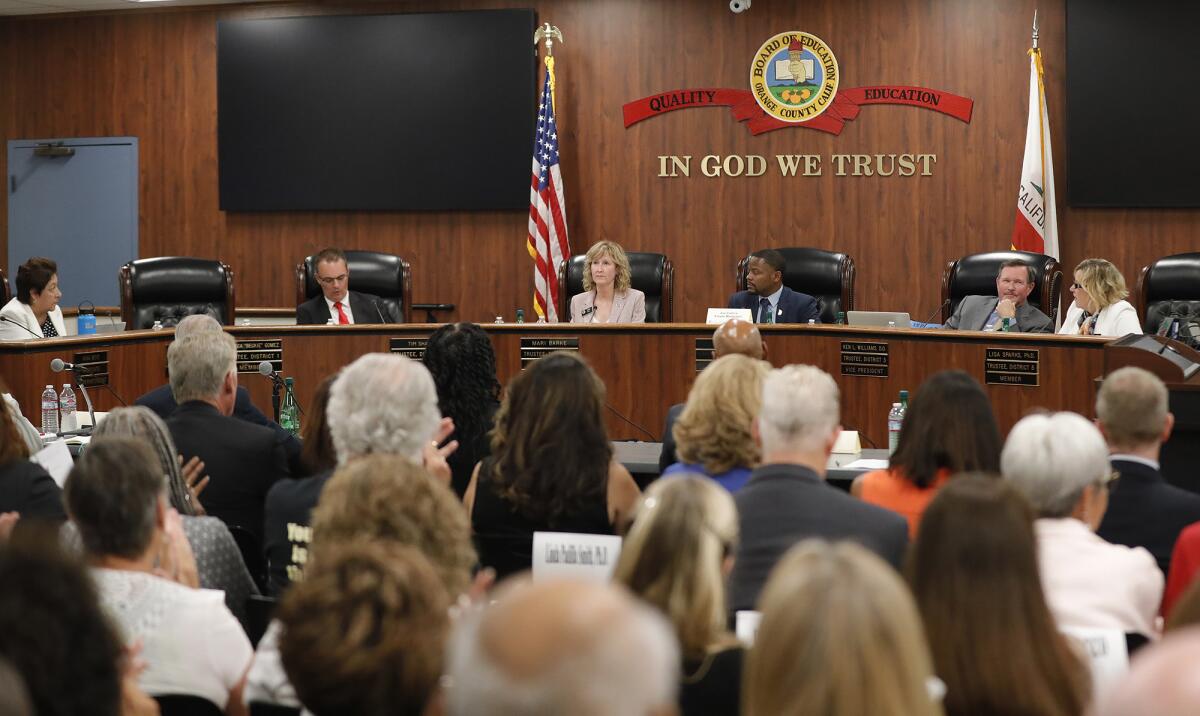Is a bill to reconfigure the O.C. Board of Education and its elections about democracy or politics?

- Share via
Is a bill proposing to add two trustees to the Orange County Board of Education and move its elections from the primary to November about ensuring democracy or politically reconfiguring the conservative majority panel? It depends on whom you ask.
Co-authors of Senate Bill 907, Josh Newman (D-Fullerton) and Dave Min (D-Irvine) claim the legislation would diversify and enhance representation on the board by putting future candidates before a wider cross-section of voters in a November election, when turnout is higher.
They additionally seek to expand the board from five members to seven, alleging five individuals cannot adequately represent a county of more than 3.15 million residents.
SB 907 passed the Senate on Tuesday. If it’s signed into law, its mandates would take effect in 2025 but would not be applied until the 2026 election. At that time, Newman said, two new at-large members might be elected to serve terms that would run until the 2030 census.
“There’s a very straightforward good governance argument that says the best government is most closely tied to constituents and when the most people have an opportunity to participate in the selection of that board,” said Newman, whose 29th District includes Anaheim, Buena Park, Fullerton and other cities in Orange, Los Angeles and San Bernardino counties.
“If incumbency is too powerful because of the barriers to either participation or information, that’s generally not a good thing.”
Trustees on the Board of Education, however, many of whom have served for several years, take a different view. They claim the bill is a partisan attempt by Democrats, backed by teachers unions, to dilute the panel’s conservative majority, which publicly supports school choice and has backed numerous charter school efforts in recent years.
President Tim Shaw, who’s traveled to Sacramento to speak in hearings against SB 907, said neither of the bill’s co-authors spoke with trustees about the possibility of changing elections from March and June primaries to November or expanding membership.
“There’s a valid point to having elections in November when turnout is higher — I understand that completely. I just don’t know that senators and assembly members all over California need to be deciding this. It’s a local decision,” Shaw said Friday. “There’s obviously a feeling that this is being done to us and not with us.”
Shaw further alleged that, were SB 907 truly nonpartisan, it would apply to other educational boards in larger counties than Orange that currently have only five members, such as San Diego County, or in a county like Los Angeles, where Board of Education trustees are not elected but appointed by county supervisors.
Newman, who claims he did not consult with teachers unions when drafting the bill, said he has talked with several legislators, Orange County superintendents and parents who’ve expressed concerns about the board’s strong pro-charter school stance. Out of the county’s 43 approved charters, 27 have been approved by the Board of Education.
“Parents in the public school system who are very involved with the PTA and other things, they’re well aware that when these decisions get made public funds can get diverted to charter schools,” Newman said Thursday.
SB 907 is not the first legislative attempt to shift the Orange County educational board’s elections to November. A prior effort — SB 286, authored by Min — failed to pass the Assembly Appropriations Committee in 2022.
Min claimed at the time the work of the board was too important to be decided by too small a portion of the electorate, citing how in 2020, 818,021 voters participated in the primary election, compared with 1,546,570 who voted in the general election.
In a statement Thursday, Min said having some electoral races be finally determined in the primary, when so many other races continue into November for the top two vote-getters, added another layer of confusion for voters. That’s something SB 907 would solve.
“SB 907 would bring us in line with the rest of the state, harmonize the Board of Education’s elections with other important November elections and ultimately help add more diverse voices to the most important K-14 educational body in the county,” he said in a statement Thursday.
Trustee Mari Barke, who joined the board in 2018, won a second term in the June 2022 primary. She said the smaller election format advantages both candidates and voters.
“It allows people to pay closer attention because they’re looking at fewer races,” she said. “I’m not afraid to run in November, I just don’t think it’s necessary.”
Expanding the board’s membership to seven could create new voter areas with interests and concerns that might differ from those of the current trustees. But it would also require a redrawing of district lines, a costly move undertaken two years ago following the 2020 U.S. Census.
Newman said if current board members were truly confident about their ability to win among a wider swath of voters, they would not oppose the bill so ardently.
“If you believe you’re the best candidate and the best person to hold this office, you’d welcome broader participation,” he said.
All the latest on Orange County from Orange County.
Get our free TimesOC newsletter.
You may occasionally receive promotional content from the Daily Pilot.










